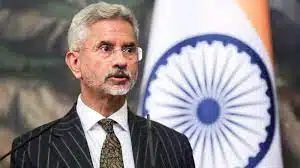India’s External Affairs Minister condemns Soros’ comments on pandemic and minorities
India’s External Affairs Minister, S. Jaishankar, has criticised billionaire investor and philanthropist George Soros, calling him “old and rich” and accusing him of interfering in India’s internal affairs.
Jaishankar’s comments came during a virtual discussion with Indian-American business leaders on February 18th, where he was asked about Soros’ recent comments on India’s handling of the COVID-19 pandemic and its treatment of minorities. Jaishankar condemned Soros’ alleged interference in India’s internal affairs, stating that he is “opinionated” and “a foreign entity” who has no right to comment on India’s domestic issues.
Soros’ foundation, the Open Society Foundations, has been critical of India’s government in the past, particularly on issues related to minority rights, freedom of expression, and the handling of the COVID-19 pandemic. The foundation has provided financial and technical assistance to various civil society organisations working in India on issues related to human rights, justice, and equality.
While Soros has not yet responded to Jaishankar’s comments, his past comments on India’s policies and his support for civil society groups have made him a controversial figure among some sections of Indian society, particularly those aligned with the ruling party.
George Soros is known as a well-known philanthropist and investor who has supported various civil society organizations and causes around the world. He founded the Open Society Foundations in 1979, which is now one of the world’s largest philanthropic organisations, with a focus on promoting human rights, democracy, and civil society.
However, Soros has also faced criticism and controversy for his political and financial activities. Some have accused him of interfering in the internal affairs of countries, while others have accused him of using his wealth and influence to manipulate financial markets.
India has been facing a number of internal and external challenges in recent years, including the COVID-19 pandemic, tensions with neighbouring countries, and internal social and political issues. The government has faced criticism from various quarters, including civil society organisations, for its handling of these issues.
Jaishankar’s criticism of Soros reflects the government’s position on the issue of external interference in India’s internal affairs. It also reflects the growing sentiment among some sections of Indian society that the country’s internal affairs should not be subject to external criticism or influence.
However, the issue is not without controversy, with many arguing that civil society organisations and individuals have a right to criticise the government and work towards improving the country’s social, economic, and political conditions. The role of philanthropic organisations such as the Open Society Foundations in this context remains a subject of debate and discussion.
In conclusion, Jaishankar’s criticism of Soros during the virtual discussion with Indian-American business leaders highlights the complex issues of external interference, civil society activism, and government policies in India. It also reflects the growing polarisation and division in Indian society on these issues. While there is a need to address the challenges facing the country, it is equally important to ensure that the rights of individuals and civil society organisations are protected and respected.













